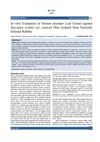 January 2017 in “Springer eBooks”
January 2017 in “Springer eBooks” The document concludes that Cutaneous Lupus Erythematosus has different forms, is influenced by genetic and environmental factors, and can be treated with various medications, but more targeted therapies are needed.
 April 2024 in “Journal of pharmacy & pharmacognosy research”
April 2024 in “Journal of pharmacy & pharmacognosy research” A compound from Calophyllum inophyllum L. leaf may help treat non-small cell lung cancer.
 January 2024 in “Deleted Journal”
January 2024 in “Deleted Journal” Essential oils like lavender, chamomile, and bergamot help manage stress and improve well-being.
 January 2024 in “Indian Journal of Animal Research”
January 2024 in “Indian Journal of Animal Research” Nerium oleander leaf extract effectively kills scabies mites in rabbits.
 November 2023 in “Deleted Journal”
November 2023 in “Deleted Journal” Cedrus libani has potential medicinal uses but needs more safety studies.
 January 2023 in “International Journal of Research Publication and Reviews”
January 2023 in “International Journal of Research Publication and Reviews” Some herbal ingredients like linalool and tea tree oil have anti-dandruff properties and are safe for use in shampoos.
 January 2022 in “Acta botanica Caucasica”
January 2022 in “Acta botanica Caucasica” Turkish herbal cosmetics use various plants for hair care, skincare, and other personal hygiene purposes.
 August 2017 in “Indian journal of history of science”
August 2017 in “Indian journal of history of science” The manuscript "Strīvilāsa" offers ancient Ayurvedic knowledge on women's health, beauty treatments, and reproductive care.
2 citations,
June 2023 in “Current Nutrition & Food Science” Hinokiflavone may help treat cancers and other health issues.
 November 2023 in “Turkish journal of botany”
November 2023 in “Turkish journal of botany” Türkiye uses many local plants to treat skin problems.
34 citations,
January 2022 in “Molecules/Molecules online/Molecules annual” Natural ingredients in cosmeceuticals are beneficial for skin and hair health with few side effects.
23 citations,
November 2018 in “International Journal of Molecular Sciences” Deoxyshikonin helps wounds heal faster in diabetic mice.
 18 citations,
June 2019 in “Clinical research in dermatology”
18 citations,
June 2019 in “Clinical research in dermatology” Acne can't be cured but can be managed with treatments like benzoyl peroxide and diet changes; it's costly and can lead to scarring and mental health issues.
 15 citations,
January 2020 in “Experimental Dermatology”
15 citations,
January 2020 in “Experimental Dermatology” The document concludes that understanding and treatments for alopecia areata have significantly advanced, now recognizing it as an autoimmune disorder.
 15 citations,
October 2021 in “Frontiers in Pharmacology”
15 citations,
October 2021 in “Frontiers in Pharmacology” Natural volatiles and essential oils have health benefits and can enhance the effects of some medicines, but more research is needed to understand how they work and their possible side effects.
7 citations,
May 2012 in “Journal of veterinary diagnostic investigation” Some young Angus cattle had skin problems due to not enough vitamin A, which got better after they were given more vitamin A.
 3 citations,
May 2021 in “Evidence-based Complementary and Alternative Medicine”
3 citations,
May 2021 in “Evidence-based Complementary and Alternative Medicine” Some traditional Chinese medicines may have anti-aging benefits and could help with hair growth, but more research is needed.
 2 citations,
November 2022 in “Frontiers in Pharmacology”
2 citations,
November 2022 in “Frontiers in Pharmacology” Local healers in Addis Ababa use 81 medicinal plants, mainly from the Asteraceae family, to treat skin and general diseases, with Echinops kebericho being an endangered plant important in their practices.
 September 2023 in “Journal of Nutrition and Metabolism”
September 2023 in “Journal of Nutrition and Metabolism” One Ashwagandha extract may help protect cells with its antioxidant properties, while another could promote hair growth.
 January 2024 in “Deleted Journal”
January 2024 in “Deleted Journal” Thuja plants have medicinal properties and potential for developing new therapies.
 January 2023 in “International Journal of Molecular Sciences”
January 2023 in “International Journal of Molecular Sciences” Maxillariinae orchids contain 62 compounds with potential health benefits, including treating skin conditions and diseases like cancer and diabetes.
 January 2022 in “International Journal of Medical Sciences”
January 2022 in “International Journal of Medical Sciences” Cedrol may be an effective treatment for colorectal cancer.
 1 citations,
August 2023 in “Nature communications”
1 citations,
August 2023 in “Nature communications” Hdac1 and Hdac2 help maintain and protect the cells that control hair growth.
 February 2024 in “Oriental Journal of Chemistry/Oriental journal of chemistry”
February 2024 in “Oriental Journal of Chemistry/Oriental journal of chemistry” Eclipta alba shows promise for treating various health issues and needs more research.
 21 citations,
November 2021 in “Biomolecules”
21 citations,
November 2021 in “Biomolecules” Eclipta prostrata is a medicinal plant that helps treat diseases, protects the liver and nerves, and promotes hair growth.
March 2024 in “Nutrients” Alopecia Areata is linked to specific gut bacteria and metabolites, indicating a complex gut microbiome.




















